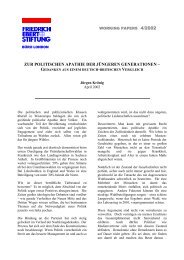Where Now for European Social Democracy? - Policy Network
Where Now for European Social Democracy? - Policy Network
Where Now for European Social Democracy? - Policy Network
You also want an ePaper? Increase the reach of your titles
YUMPU automatically turns print PDFs into web optimized ePapers that Google loves.
MARISOL TOURAINE 95A degree of violence and incivilities are taking root in the perceptionof a socially hostile environment. Conversely, this insecurity isincreasing the public’s sense of uncertainty, and its need <strong>for</strong> theprotection that reduces this. It is not insignificant that the redefinitionof welfare policy must intervene at a moment marked, particularly inFrance, by a strong sense of insecurity. It is an illusion to imagine thatthe re<strong>for</strong>m of these policies will produce a reduction in their cost.<strong>Social</strong> needs are growing and it is not possible to respond to them bytaking the risk of social disintegration. Our societies need to find a new‘historic compromise’, which will allow us to reconcile the constraintsof mobility resulting from economic dynamism, and the demand <strong>for</strong>security – the sole guarantee of civil, social and national integration.Systems of protection under pressureThe crisis of social states is manifested firstly as a financial crisis. Therise of unemployment and poverty, ageing populations, and the growthof health spending have suddenly provoked a questioning of the socialsystem. But the policy of financial restriction, which has been imposedacross all domains in France, responds to neither expectations norneeds. Too restrictive <strong>for</strong> some, too loose <strong>for</strong> others, the post-warcompromise has found its limits. It is today confronted with fiveprinciple challenges that cannot be ignored.The first of these challenges is the disappearance of the socialconditions on which this system was founded, notably in France. <strong>Social</strong>security was established in the context of economic growth, and inparticular because of the double security of employment and familystructures. It was the head of the family, the breadwinner, whothrough his employment provided <strong>for</strong> those economically dependent onhim. The profound changes in employment in addition to the mutationsin family structures have weakened the guarantees to which theywere attached.This double trans<strong>for</strong>mation has also resulted in an evolution in thenature of the risks that need to be covered. On the one hand the riskslinked to the world of work are evolving, and yet they are not any morethe dominant <strong>for</strong>ce. They are evolving in that the accidents of work



